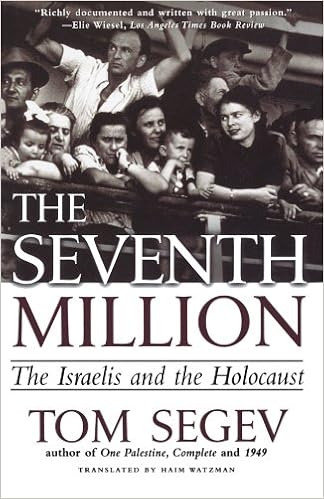
The Seventh Million is the first book to show the decisive impact of the Holocaust on the identity, ideology, and politics of Israel. Drawing on diaries, interviews, and thousands of declassified documents, Segev reconsiders the major struggles and personalities of Israel's past, including Ben-Gurion, Begin, and Nahum Goldmann, and argues that the nation's legacy has, at critical moments--the Exodus affair, the Eichmann trial, the case of John Demjanjuk--have been molded and manipulated in accordance with the ideological requirements of the state. The Seventh Million uncovers a vast and complex story and reveals how the bitter events of decades past continue to shape the experiences not just of individuals but of a nation.
This is an unflattering examination of how political positions have shaped Israeli attitudes toward the Holocaust. Segev (1949: The First Israelis, 1986) covers world events for Ha'aretz, a leading Israeli newspaper. The ``seventh million'' is Segev's metaphor for the yishuv (the Jewish population of Palestine and, later, Israel), still grappling to come to terms with the memory of the six million Jews exterminated by Hitler. In his telling--based on thousands of archival documents and numerous interviews--the Holocaust became a political football in the hands of the various factions that continue to plague Israel. Few idols are left unscathed here--not Chaim Weizmann, not Ben-Gurion, not Menachem Begin. Zionists like Ben-Gurion, Segev says, had only scorn for the ‚migr‚s who managed to escape from Germany to Palestine before WW II, and for Jews throughout the world who opted for what the Israeli leader considered the false security of their native lands instead of flocking to Palestine to build up the Homeland. Early settlers resented the ``yekkes''--their disparaging term for German immigrants--for their individualistic, capitalistic notions, so different from the communal, socialist ideals of the Zionist pioneers. Efforts to spirit Jews out of Europe during and after the war, Segev contends, were generally guided by political considerations as each faction shamefully focused on bringing in only those individuals who might strengthen its own position. Similarly, the trials of Adolf Eichmann and John Demjanjuk have become skirmishes in factional battles to gain advantage from the Holocaust. Segev concludes with the hope that the lesson of the Holocaust will, in the end, be a humanist one--accepting the need to preserve democracy, to fight racism, to defend human rights, and to refuse to obey manifestly illegal orders. But he acknowledges that this lesson will be difficult to learn as long as Israel must fight to defend itself and to justify its very existence. A powerful and disturbing book, sure to arouse heated debate.
No comments:
Post a Comment